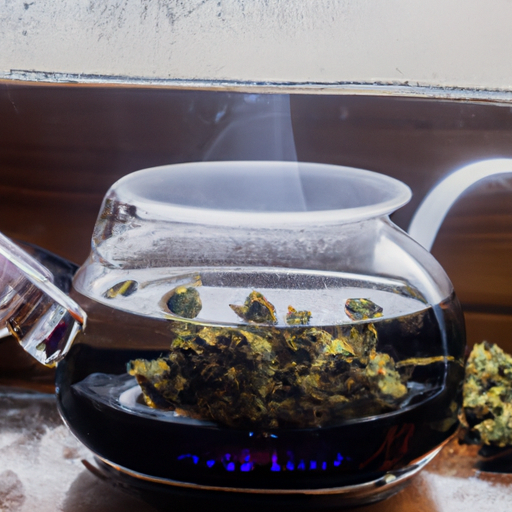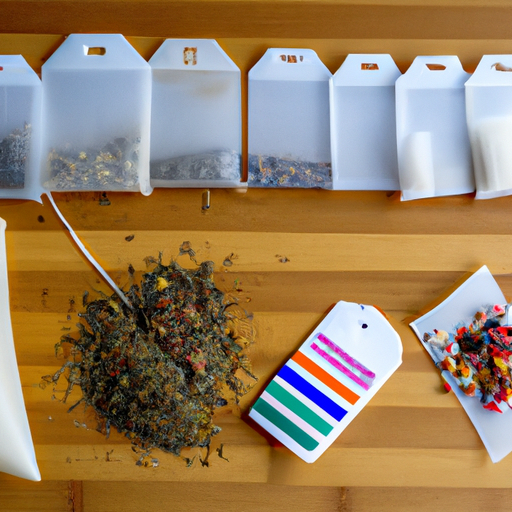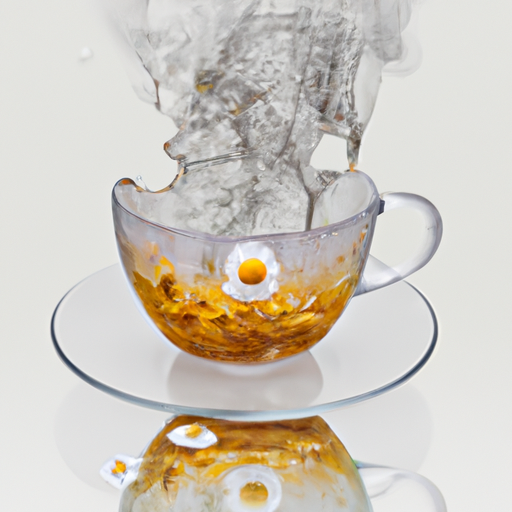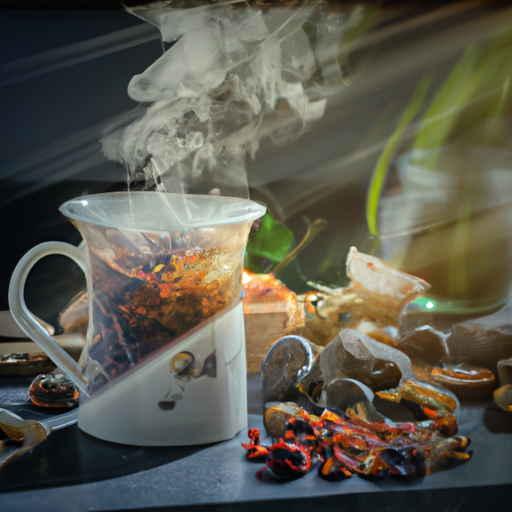Did you know that tea is the second most widely consumed beverage in the world, after water? It’s no surprise considering the countless varieties and flavors available. But when it comes to deciding between black tea and herbal tea, which one is better for you? That’s a question many tea enthusiasts ponder.
In this article, I will explore the origins, processing, flavor profiles, and health considerations of both black tea and herbal tea. By the end, you will have a better understanding of the differences between the two and be able to make an informed decision based on your personal preferences and well-being.
So, whether you’re a black tea lover or a herbal tea aficionado, keep reading to discover which one is the best fit for you.
Key Takeaways
- Black tea is made from the leaves of the Camellia sinensis plant and undergoes oxidation, while herbal tea offers a wide variety of ingredients and flavors.
- Herbal tea has health benefits such as improved digestion and boosted immune system, while black tea contains antioxidants and caffeine which boost metabolism and improve alertness.
- Herbal teas like chamomile and lavender promote better sleep, while ginger tea aids digestion and relieves nausea.
- Black tea contains caffeine and may disrupt sleep quality, while herbal tea is naturally caffeine-free and can aid digestion and alleviate discomfort.
The Origins and Processing of Black Tea
Black tea is made from the leaves of the Camellia sinensis plant, undergoing a complex oxidation process that gives it its distinct flavor and rich, bold characteristics. The processing techniques for black tea involve withering, rolling, oxidation, and drying.
After the leaves are plucked, they are spread out to wither, which reduces moisture content. Then, the leaves are rolled to break their cell walls and release enzymes, which initiates oxidation. This process is crucial as it allows the leaves to develop the unique flavors and aromas associated with black tea.
The oxidation is then halted by heating or firing the leaves, which preserves the desired characteristics. After this, the leaves are dried to remove any remaining moisture.
Now that we understand the origins and processing of black tea, let’s explore the variety and benefits of herbal tea.
The Variety and Benefits of Herbal Tea
When it comes to herbal tea, there’s a wide variety of ingredients to choose from. Each herb brings its own unique flavor and potential health benefits. From chamomile to peppermint to ginger. Drinking herbal tea has been associated with various health benefits. It can improve digestion, boost the immune system, and promote relaxation.
Different Herbal Tea Ingredients
If you’re looking for a flavorful and caffeine-free option, herbal tea is the way to go with its diverse range of ingredients. Different types of herbal tea offer unique flavors and benefits.
Here are five popular ingredients you can find in herbal teas:
-
Chamomile: Known for its calming properties, chamomile tea is often enjoyed before bed to promote relaxation and better sleep.
-
Peppermint: With its refreshing and soothing qualities, peppermint tea is a great choice for digestion and relieving stomach discomfort.
-
Lavender: This aromatic herb is commonly used in herbal teas to promote relaxation and reduce anxiety.
-
Ginger: Known for its warming effects, ginger tea can help with digestion and relieve nausea.
-
Rooibos: This South African herbal tea is rich in antioxidants and has a naturally sweet and nutty flavor.
Now, let’s explore the health benefits of herbal tea.
Health Benefits of Herbal Tea
Discover the delightful benefits of sipping on soothing and satisfying herbal teas. Herbal tea, made from different types of herbs, has been enjoyed for centuries for its various health benefits. One of the key advantages of herbal tea is its positive impact on digestion. Certain herbs, such as peppermint, ginger, and chamomile, can help alleviate digestive issues like bloating and indigestion. To illustrate the benefits of herbal tea, refer to the following table:
| Herbal Tea Ingredient | Benefits for Digestion |
|---|---|
| Peppermint | Relieves stomach pain |
| Ginger | Reduces nausea |
| Chamomile | Soothes digestive system |
By incorporating herbal tea into your routine, you can experience these benefits and more. Now let’s explore the flavor profiles of black tea.
Flavor Profiles of Black Tea
When it comes to black tea, the flavor profiles are known for being bold and strong. As a tea enthusiast, I enjoy the robustness and richness that black tea offers.
The aroma is equally enticing, with its deep and complex notes that fill the room.
And let’s not forget about the aftertaste, which lingers pleasantly on the palate, leaving a lasting impression.
Bold and Strong Flavors
Although black tea and herbal tea both have bold and strong flavors, herbal tea offers a wider variety of options due to its infusion of various herbs and spices.
Black tea is known for its bold and robust flavor, often described as rich and full-bodied. It has a stronger taste compared to herbal tea, which can be more delicate and subtle in flavor. The brewing time also plays a role in the flavor profile of these teas.
Black tea is typically steeped for a longer time to bring out its strong flavor, while herbal tea requires a shorter brewing time to avoid overpowering the delicate flavors of the herbs and spices.
Moving on to the next section about aroma and aftertaste, it is important to consider how these aspects contribute to the overall tea-drinking experience.
Aroma and Aftertaste
Get ready to savor the aromatic experience of your tea, as studies have shown that the aroma of a cup of tea can greatly influence your overall enjoyment of the beverage. The scent of tea has been linked to various aromatherapy benefits, such as promoting relaxation and reducing stress.
Whether you prefer the robust and bold aroma of black tea or the delicate and floral scent of herbal tea, the aroma plays a significant role in enhancing your tea-drinking experience.
Additionally, the aftertaste of tea can also contribute to your overall satisfaction. While black tea may leave a lingering malty or smoky aftertaste, herbal teas can offer a range of flavors, from fruity and sweet to earthy and herbal.
So, get ready to explore the diverse flavor profiles of herbal tea in the next section.
Flavor Profiles of Herbal Tea
Herbal tea offers a delightful array of flavors that can satisfy even the most discerning taste buds. One of the advantages of herbal tea is the variety of blends available for relaxation. For those seeking a calming experience, blends such as chamomile, lavender, and lemon balm can provide a soothing and tranquil effect.
Additionally, herbal tea can be infused with fruit flavors, adding a refreshing twist to the taste. Whether it’s the tanginess of citrus or the sweetness of berries, these fruity infusions can create a vibrant and flavorful cup of tea.
As we explore the benefits of herbal tea further, it’s important to consider its caffeine content in comparison to black tea.
Caffeine Content Comparison
You might be surprised to learn that when it comes to caffeine content, herbal tea is like a breath of fresh air compared to its black tea counterpart. If you’re looking to reduce your caffeine intake or avoid it altogether, herbal tea is a great choice. Here are four reasons why:
-
Effects of caffeine on the body: Caffeine can have various effects on the body, such as increased heart rate, restlessness, and difficulty sleeping. By opting for herbal tea, which is caffeine-free, you can avoid these potential side effects.
-
Choosing a caffeine-free alternative: Herbal teas are a fantastic alternative for those who want to enjoy a warm and comforting beverage without the stimulating effects of caffeine. With a wide range of flavors and blends available, you can easily find a herbal tea that suits your taste preferences.
-
Health considerations: Caffeine sensitivity varies from person to person. If you’re sensitive to caffeine or have certain health conditions that can be aggravated by it, switching to herbal tea can be a healthier choice.
-
Transitioning to a caffeine-free lifestyle: If you’re trying to reduce your caffeine intake or eliminate it completely, starting with herbal tea is a great step towards achieving your goal.
Now, let’s move on to the next section, where we will discuss some health considerations to keep in mind when choosing between black tea and herbal tea.
Health Considerations
Moving on from the caffeine content comparison, let’s now delve into the health considerations when it comes to choosing between black tea and herbal tea. As an individual seeking the best tea option for myself, I find it important to consider how each tea affects my overall well-being. One aspect to consider is the impact of tea on sleep quality. While black tea contains caffeine, which can disrupt sleep, herbal teas are generally caffeine-free and can promote a good night’s rest. Additionally, the effect of tea on digestion is worth considering. Herbal teas, such as peppermint or ginger, have been known to aid digestion and alleviate digestive discomfort. To present this information more visually, here is a table summarizing the health considerations:
| Health Considerations | Black Tea | Herbal Tea |
|---|---|---|
| Sleep Quality | Contains caffeine, may disrupt sleep | Caffeine-free, can promote better sleep |
| Digestion | May cause digestive discomfort | Can aid digestion, alleviate discomfort |
Considering the impact on sleep quality and digestion, it’s crucial to weigh these factors when choosing between black tea and herbal tea. Now, let’s explore the next section on personal preference and well-being.
Personal Preference and Well-Being
When it comes to personal preference and well-being, two key points to consider are finding your preferred taste profile and considering your health needs.
Everyone has different taste preferences, so it’s important to explore different tea options to find what suits you best.
Additionally, taking into account your health needs, such as any allergies or dietary restrictions, can help ensure that you choose a tea that not only tastes good but also supports your overall well-being.
Ultimately, finding the right balance between taste and health is essential for enjoying tea to its fullest.
Finding Your Preferred Taste Profile
Exploring your taste preferences can lead you to discover the perfect tea for your palate. When it comes to personal preferences, everyone’s taste buds are unique.
Some people may prefer the bold and robust flavor of black tea, while others may lean towards the subtle and soothing taste of herbal tea. To find your preferred taste profile, it’s essential to try different varieties of both black and herbal teas. Experiment with different blends, flavors, and brewing methods to see what appeals to you.
Pay attention to the aroma, flavor notes, and overall experience when sipping each cup. By exploring your taste preferences, you can find the tea that brings you the most enjoyment.
Transitioning into considering your health needs, it’s also important to take into account any specific health concerns or dietary restrictions you may have.
Considering Your Health Needs
Considering my health needs, it’s vital to be aware that drinking tea can have significant benefits, such as reducing the risk of heart disease by 20%. When considering dietary restrictions, it’s important to explore different tea blends to find the one that suits your needs.
Black tea and herbal tea offer distinct advantages depending on your health concerns. Black tea contains antioxidants and caffeine, which can boost metabolism and improve alertness. However, it may not be suitable for individuals with caffeine sensitivity or those who need to limit their intake.
On the other hand, herbal tea is naturally caffeine-free and can provide various health benefits depending on the herbs used. For example, chamomile tea can aid in relaxation and sleep, while ginger tea can help with digestion.
It’s essential to consult with a healthcare professional to determine which tea is best for your specific health needs and dietary restrictions.
Frequently Asked Questions
Can black tea help improve digestion and relieve stomach discomfort?
Yes, black tea can improve digestion and relieve stomach discomfort. It contains tannins that help stimulate digestive enzymes and soothe the digestive system. Herbal tea can also be beneficial for digestive health with its natural properties.
Is herbal tea a suitable alternative for individuals with caffeine sensitivity?
Herbal tea is a helpful alternative to coffee for those with caffeine sensitivity. It offers a plethora of benefits, such as soothing effects and various health-promoting properties. However, drawbacks include potential interactions with medications and limited scientific evidence on its efficacy.
Are there any specific herbal teas that can help with stress and anxiety relief?
Some herbal teas, such as chamomile and lavender, have been shown to help with stress and anxiety relief. These herbal teas offer a range of flavors and provide benefits for overall well-being.
Can black tea and herbal tea be consumed during pregnancy?
Both black tea and herbal tea can be consumed during pregnancy, but it’s important to moderate your intake. Black tea contains caffeine, while herbal teas offer various benefits like calming properties. Always consult with your healthcare provider for personalized advice.
Which type of tea is better for promoting weight loss and boosting metabolism?
Black tea is a better choice for weight loss and boosting metabolism compared to green tea. It contains compounds that can increase fat oxidation and energy expenditure. Additionally, herbal tea offers benefits for skin health.
Conclusion
In conclusion, after exploring the origins, processing, flavor profiles, and health considerations of black tea and herbal tea, it’s clear that both options have their own unique benefits.
Black tea, with its bold flavors and moderate caffeine content, is a great choice for those looking for a morning pick-me-up.
On the other hand, herbal tea offers a wide range of flavors and is caffeine-free, making it an excellent option for relaxation and bedtime.
Ultimately, the decision between the two comes down to personal preference and individual well-being. So, whether you’re sipping on a steaming cup of black tea or enjoying the soothing qualities of herbal tea, both can be a delightful addition to your daily routine.










